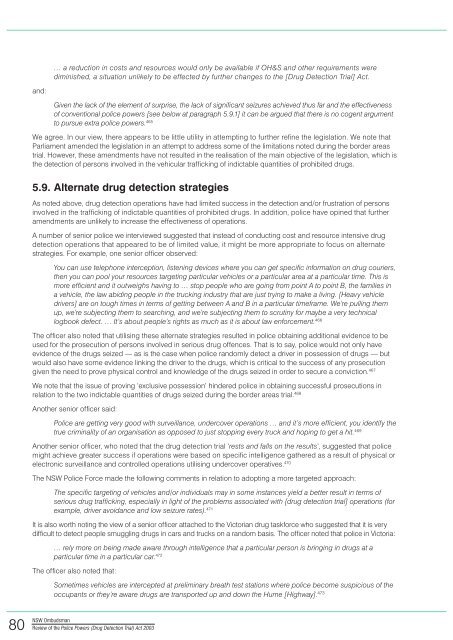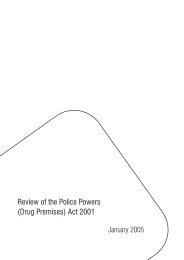Review of the Police Powers (Drug Detection Trial) Act 2003 - NSW ...
Review of the Police Powers (Drug Detection Trial) Act 2003 - NSW ...
Review of the Police Powers (Drug Detection Trial) Act 2003 - NSW ...
Create successful ePaper yourself
Turn your PDF publications into a flip-book with our unique Google optimized e-Paper software.
… a reduction in costs and resources would only be available if OH&S and o<strong>the</strong>r requirements were<br />
diminished, a situation unlikely to be effected by fur<strong>the</strong>r changes to <strong>the</strong> [<strong>Drug</strong> <strong>Detection</strong> <strong>Trial</strong>] <strong>Act</strong>.<br />
and:<br />
Given <strong>the</strong> lack <strong>of</strong> <strong>the</strong> element <strong>of</strong> surprise, <strong>the</strong> lack <strong>of</strong> significant seizures achieved thus far and <strong>the</strong> effectiveness<br />
<strong>of</strong> conventional police powers [see below at paragraph 5.9.1] it can be argued that <strong>the</strong>re is no cogent argument<br />
to pursue extra police powers. 465<br />
We agree. In our view, <strong>the</strong>re appears to be little utility in attempting to fur<strong>the</strong>r refine <strong>the</strong> legislation. We note that<br />
Parliament amended <strong>the</strong> legislation in an attempt to address some <strong>of</strong> <strong>the</strong> limitations noted during <strong>the</strong> border areas<br />
trial. However, <strong>the</strong>se amendments have not resulted in <strong>the</strong> realisation <strong>of</strong> <strong>the</strong> main objective <strong>of</strong> <strong>the</strong> legislation, which is<br />
<strong>the</strong> detection <strong>of</strong> persons involved in <strong>the</strong> vehicular trafficking <strong>of</strong> indictable quantities <strong>of</strong> prohibited drugs.<br />
5.9. Alternate drug detection strategies<br />
As noted above, drug detection operations have had limited success in <strong>the</strong> detection and/or frustration <strong>of</strong> persons<br />
involved in <strong>the</strong> trafficking <strong>of</strong> indictable quantities <strong>of</strong> prohibited drugs. In addition, police have opined that fur<strong>the</strong>r<br />
amendments are unlikely to increase <strong>the</strong> effectiveness <strong>of</strong> operations.<br />
A number <strong>of</strong> senior police we interviewed suggested that instead <strong>of</strong> conducting cost and resource intensive drug<br />
detection operations that appeared to be <strong>of</strong> limited value, it might be more appropriate to focus on alternate<br />
strategies. For example, one senior <strong>of</strong>ficer observed:<br />
You can use telephone interception, listening devices where you can get specific information on drug couriers,<br />
<strong>the</strong>n you can pool your resources targeting particular vehicles or a particular area at a particular time. This is<br />
more efficient and it outweighs having to … stop people who are going from point A to point B, <strong>the</strong> families in<br />
a vehicle, <strong>the</strong> law abiding people in <strong>the</strong> trucking industry that are just trying to make a living. [Heavy vehicle<br />
drivers] are on tough times in terms <strong>of</strong> getting between A and B in a particular timeframe. We’re pulling <strong>the</strong>m<br />
up, we’re subjecting <strong>the</strong>m to searching, and we’re subjecting <strong>the</strong>m to scrutiny for maybe a very technical<br />
logbook defect. … It’s about people’s rights as much as it is about law enforcement. 466<br />
The <strong>of</strong>ficer also noted that utilising <strong>the</strong>se alternate strategies resulted in police obtaining additional evidence to be<br />
used for <strong>the</strong> prosecution <strong>of</strong> persons involved in serious drug <strong>of</strong>fences. That is to say, police would not only have<br />
evidence <strong>of</strong> <strong>the</strong> drugs seized — as is <strong>the</strong> case when police randomly detect a driver in possession <strong>of</strong> drugs — but<br />
would also have some evidence linking <strong>the</strong> driver to <strong>the</strong> drugs, which is critical to <strong>the</strong> success <strong>of</strong> any prosecution<br />
given <strong>the</strong> need to prove physical control and knowledge <strong>of</strong> <strong>the</strong> drugs seized in order to secure a conviction. 467<br />
We note that <strong>the</strong> issue <strong>of</strong> proving ‘exclusive possession’ hindered police in obtaining successful prosecutions in<br />
relation to <strong>the</strong> two indictable quantities <strong>of</strong> drugs seized during <strong>the</strong> border areas trial. 468<br />
Ano<strong>the</strong>r senior <strong>of</strong>ficer said:<br />
<strong>Police</strong> are getting very good with surveillance, undercover operations … and it’s more efficient, you identify <strong>the</strong><br />
true criminality <strong>of</strong> an organisation as opposed to just stopping every truck and hoping to get a hit. 469<br />
Ano<strong>the</strong>r senior <strong>of</strong>ficer, who noted that <strong>the</strong> drug detection trial ‘rests and falls on <strong>the</strong> results’, suggested that police<br />
might achieve greater success if operations were based on specific intelligence ga<strong>the</strong>red as a result <strong>of</strong> physical or<br />
electronic surveillance and controlled operations utilising undercover operatives. 470<br />
The <strong>NSW</strong> <strong>Police</strong> Force made <strong>the</strong> following comments in relation to adopting a more targeted approach:<br />
The specific targeting <strong>of</strong> vehicles and/or individuals may in some instances yield a better result in terms <strong>of</strong><br />
serious drug trafficking, especially in light <strong>of</strong> <strong>the</strong> problems associated with [drug detection trial] operations (for<br />
example, driver avoidance and low seizure rates). 471<br />
It is also worth noting <strong>the</strong> view <strong>of</strong> a senior <strong>of</strong>ficer attached to <strong>the</strong> Victorian drug taskforce who suggested that it is very<br />
difficult to detect people smuggling drugs in cars and trucks on a random basis. The <strong>of</strong>ficer noted that police in Victoria:<br />
… rely more on being made aware through intelligence that a particular person is bringing in drugs at a<br />
particular time in a particular car. 472<br />
The <strong>of</strong>ficer also noted that:<br />
Sometimes vehicles are intercepted at preliminary breath test stations where police become suspicious <strong>of</strong> <strong>the</strong><br />
occupants or <strong>the</strong>y’re aware drugs are transported up and down <strong>the</strong> Hume [Highway]. 473<br />
80<br />
<strong>NSW</strong> Ombudsman<br />
<strong>Review</strong> <strong>of</strong> <strong>the</strong> <strong>Police</strong> <strong>Powers</strong> (<strong>Drug</strong> <strong>Detection</strong> <strong>Trial</strong>) <strong>Act</strong> <strong>2003</strong>

















